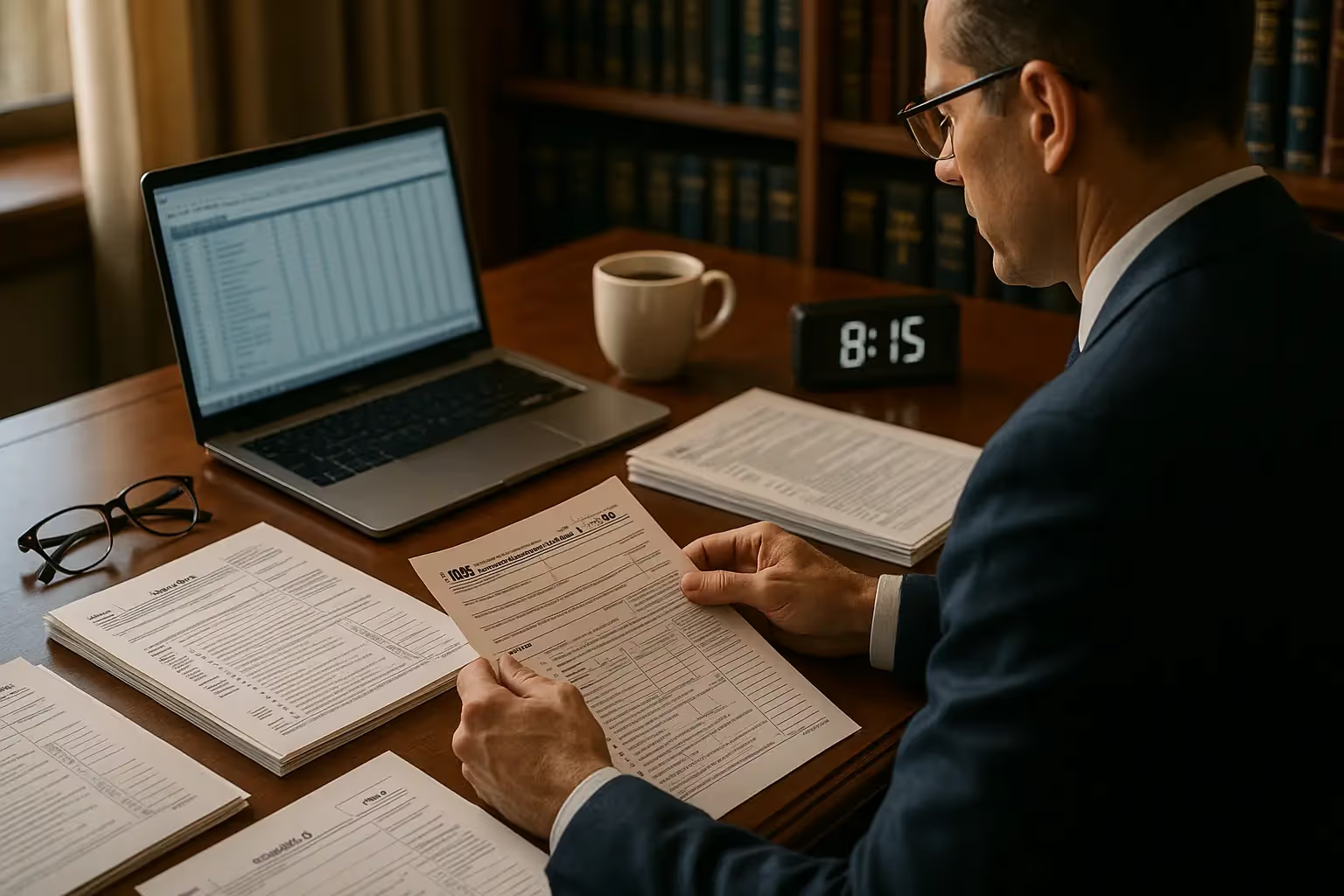
Form 945, or the Annual Return of Withheld Federal Income Tax, is the form businesses must file when they withhold federal income tax from nonpayroll payments such as pensions, annuities, and certain gambling winnings. Unlike payroll tax returns, which are filed quarterly, Form 945 covers the entire tax year and consolidates withholding into one annual return. Filing Form 945 on time ensures that the Internal Revenue Service (IRS) has accurate records of the taxes withheld and prevents unnecessary penalties.
If you failed to file your 2020 Form 945, it is essential to act quickly. An unfiled tax return can accumulate penalties, interest charges, and an unpaid balance that may grow larger than the original amount owed. The IRS treats unfiled forms seriously, and the longer you delay, the more difficult it may become to resolve the issue. Addressing the matter in good faith—filing as soon as possible and contacting the IRS if you cannot pay immediately—can reduce the risk of harsher consequences.
This guide provides step-by-step instructions for filing Form 945, explains the different types of penalties and late payment penalties you may face, and outlines available resolution options, such as installment agreements and penalty abatement. It also highlights special rules, including the Trust Fund Recovery Penalty, that can personally affect business owners and financial officers. By the end, you will understand.
What Is Form 945, and Who Needs to File It?
Form 945 is an IRS form titled Annual Return of Withheld Federal Income Tax. It is used to report withheld federal income tax from nonpayroll payments, which differ from wages reported on Form 941 each quarter. Instead, Form 945 covers the entire tax year in one filing, making it a yearly obligation for specific businesses and organizations.
Unlike payroll taxes involving Social Security and Medicare contributions, Form 945 strictly reports taxes withheld from nonwage sources. This distinction is important because failure to file the correct form may lead to misreporting, assessed penalties, and additional interest charges. Employers should know when Form 941 applies and when Form 945 is required. For complete IRS guidance, see About Form 945, Annual Return of Withheld Federal Income Tax.
You may need to file Form 945 if your business is responsible for backup withholding or for withholding from certain distributions and prizes. The following groups are commonly required to file:
- Some businesses and corporations make payments that are subject to withholding, such as pensions or annuities.
- Casinos and other gaming establishments are required to issue reportable gambling winnings when payouts meet IRS thresholds.
- Government entities or organizations pay Social Security benefits when voluntary withholding has been elected by the recipient.
- Alaska Native Corporations distribute taxable dividends or benefits that must be reported and subject to withholding.
- Employers or withholding agents acting on behalf of others are responsible for properly reporting all required withholdings.
Filing requirements also apply even if you have only one payment that requires withholding during the period. However, you do not need to file if there were no withholdings. Staying compliant ensures that your employer identification number (EIN) remains in good standing with the IRS, avoids late filing penalties, and demonstrates that your business follows federal law.
Payments That Require Filing Form 945
The IRS requires Form 945 to be filed when certain nonpayroll payments are subject to federal income tax withholding. These payments fall into a few common categories, each with rules and examples.
Retirement and Pension Distributions
Federal income tax must be withheld from many retirement-related payouts. Examples include:
- Withdrawals from 401(k) and 403(b) employer-sponsored plans are taxable and require withholding.
- Traditional IRA distributions are also taxable withdrawals from individual retirement accounts, and federal tax must be withheld.
- Pensions and annuities are considered regular income received from retirement benefits, so they are subject to federal income tax withholding.
- Military retirement payments made to former service members are treated as taxable income and require withholding as well.
Gambling and Lottery Winnings
Casinos, lotteries, and other gaming institutions must withhold and report winnings above certain thresholds. This includes:
- Casino winnings from slot machines, card games, and other regulated gambling sources are subject to federal income tax withholding.
- Lottery prizes, whether taken as a lump-sum payment or in installments, must have taxes withheld before payment.
- Sports betting winnings from online or in-person wagers that generate taxable payouts are also subject to withholding.
- Indian gaming profits, such as distributions from gaming operations on tribal lands, are considered taxable income and require withholding.
Other Nonpayroll Payments
In addition to retirement and gambling income, Form 945 applies to various other payment types, including:
- Backup withholding is required when a payee fails to provide a valid taxpayer identification number or when the IRS issues a notice to begin withholding.
- Voluntary Social Security withholding is an option chosen by individuals who want federal income taxes withheld directly from their benefits.
- Certain government payments are subject to withholding when the recipient has elected to have taxes withheld from federal disbursements.
- Alaska Native Corporation distributions, including dividends or other taxable payments to shareholders, must also follow federal withholding requirements.
If your business or organization makes any of these payments, you are generally required to file Form 945. Proper reporting ensures compliance with federal tax law and avoids penalties for failure to collect or remit the correct total tax due.
Step-by-Step Process for Filing an Unfiled 2020 Form 945
Filing an unfiled 2020 Form 945 requires gathering accurate information, using the correct IRS resources, and carefully completing the form. Follow these steps to ensure compliance and reduce the risk of additional penalty assessments.
1. Gather Required Documentation
Before completing the form, collect records that reflect your taxes withheld during the 2020 tax year. These may include:
- IRS correspondence related to missing or unfiled returns should be kept as part of your records.
- Bank deposit records that show federal tax deposits must be maintained for verification purposes.
- Form 1099-MISC is required for reporting non-employee payments that are subject to backup withholding.
- Form W-2G is used to report gambling winnings that meet IRS reporting thresholds.
- Form 1099-R is used for reporting retirement or pension distributions that may be taxable.
Accurate records will help you calculate the total amount owed and prevent mistakes.
2. Obtain the Correct Forms and Instructions
Always use official IRS resources when preparing an annual return.
- Download the 2020 Form 945 and the corresponding instructions from IRS.gov (not the current year version).
- Review the adjusted annual return (Form 945-X) if you must correct a previously filed tax return.
- Use Form 945-A (Record of Federal Tax Liability) or Form 945-V (payment voucher) if applicable.
- Verify that your employer identification number (EIN) and business details match IRS records exactly.
3. Fill out the form one line at a time.
When filling out the form, pay close attention to each section:
- Line 1 - Federal Income Tax Withheld: Enter taxes withheld from pensions, annuities, military retirement, and Indian gaming profits.
- Line 2 - Backup Withholding: Report all backup withholding amounts, including those for gambling winnings.
- Line 3 - Total Taxes: To calculate, add the amounts from Lines 1 and 2. This figure must equal your reported liability.
- Line 4 - Total Deposits: Enter deposits made during 2020, including credits or overpayments from the previous year.
- Line 5 - Balance. Due: If the unpaid amount exceeds deposits, report the difference as your liability.
- Line 6 - Overpayment: Indicate whether the IRS should issue a refund or apply it to the next tax year.
- Line 7 - Monthly Summary: This is required if your total tax was $2,500 or more and you were a monthly depositor.
Double-check every entry. Even minor mistakes may delay processing, trigger a late filing notice, or increase your unpaid balance. Filing on time and in good faith reduces the risk of maximum penalty assessments and interest charges.
IRS Penalties and Interest for Late Filing
Failing to file Form 945 on time can lead to multiple penalty assessments and ongoing interest charges. The IRS applies these fees to encourage compliance and can significantly increase the unpaid balance if left unresolved. Understanding how each penalty works helps you calculate potential costs and plan a strategy for resolution.
Failure-to-File Penalty
- This penalty amounts to 5% of the unpaid tax for every month, or any portion of a month, that the tax return is submitted late. The maximum penalty is 25% of the unpaid amount.
Example: If your total tax was $8,000 and you filed six months late, the IRS would assess a $2,000 penalty ($8,000 × 25%).
Failure-to-Pay Penalty
- This late payment penalty is 0.5% of the unpaid balance. For each month, the tax remains unpaid after the original due date.
- It continues until the total amount is paid or reaches 25%.
Example: If you owe $5,000 in taxes and have not paid them for 12 months, the penalty would be $300 ($5,000 × 6%).
Failure-to-Deposit Penalty
- This applies if employers do not deposit withheld taxes correctly or on time.
- Rates vary depending on how late the deposit was:
- 2% for deposits made 1–5 days late
- 5% for deposits made 6–15 days late
- 10% for deposits made more than 15 days late
- 15% if the payment is unpaid for more than 10 days after an IRS demand notice
Interest Charges
- Interest is applied daily to both the unpaid tax and any penalties.
- Rates are determined quarterly based on federal short-term rates plus three percentage points.
Example: A $10,000 liability with combined penalties of $2,500 will also accrue interest until the full balance is satisfied.
These penalties and interest charges can quickly exceed the original liability. Even without full payment, filing the annual return promptly shows good faith and may allow you to request a waiver or other relief.
The Trust Fund Recovery Penalty (TFRP) Explained
One of the most severe penalties the IRS can impose for improperly remitting withheld taxes is the Trust Fund Recovery Penalty (TFRP). It applies to “trust fund taxes,” which include income tax withheld from employees and backup withholding reported on Form 945. Unlike standard penalties, the TFRP can hold individuals personally responsible for the full unpaid amount, even if the business cannot pay.
The IRS uses the TFRP to ensure those responsible for collecting and paying federal taxes cannot ignore their obligations. Responsibility does not require company ownership—it can extend to anyone with authority over financial decisions or access to funds. The penalty equals 100% of the unpaid tax, making it a powerful enforcement tool.
Who Can Be Held Personally Liable?
- The IRS may assess the Trust Fund Recovery Penalty (TFRP) against corporate officers, such as presidents, treasurers, or chief financial officers, who play a significant role in managing finances.
- Partners in partnerships or members of limited liability companies can also be held responsible for unpaid trust fund taxes.
- Shareholders who control finances or sign checks on behalf of the corporation may be assessed the penalty as well.
- Certain employees who have the authority to authorize bill payments, sign checks, or decide which debts to pay can also be liable.
To apply the TFRP, the IRS must prove willfulness. This does not mean intent to defraud, but rather knowledge of the tax obligation combined with a decision to use funds for other purposes. The process usually begins with Letter 1153, giving the individual 60 days to respond or file a request for appeal.
Taxpayers have rights in this process, including the right to refer the case to Appeals, challenge determinations, and provide evidence that they were not responsible. Because the TFRP can equal the total amount of the liability, it is crucial to respond promptly and, if needed, seek professional guidance.
Resolution Options if You Can’t Pay in Full
An unpaid balance from an unfiled 2020 Form 945 can feel overwhelming, but the IRS offers several resolution paths. These options allow employers and withholding agents to address liabilities in good faith while avoiding harsher collection actions.
Installment Agreements
An installment agreement allows you to pay your liability over time.
- Guaranteed agreements: These are available if you owe $10,000 or less in taxes and can pay within 36 months.
- Streamlined agreements: These are offered for balances up to $25,000 and allow repayment terms of up to 72 months.
- Full financial disclosure agreements: Required for larger balances; the IRS reviews income, expenses, and assets to determine what you can collect and pay.
Penalty Abatement
You may qualify to have penalty charges reduced or removed.
- First-time penalty abatement: This is granted if you filed all tax returns for the previous year, paid or arranged to pay, and have no recent penalties.
- Reasonable cause relief: Applies when circumstances beyond your control prevented timely filing or payment. Common examples include natural disasters, illness, or missing records. Taxpayers can review the IRS guidance on Penalty Relief for Reasonable Cause for eligibility details.
- A written request or Form 843 may be required to claim this relief.
Offer in Compromise (OIC)
An OIC allows settlement for less than the total amount owed when full payment would cause hardship.
- Doubt about liability: These are used when you believe the IRS has incorrectly assessed tax.
- Doubt about collectibility: These are accepted when your assets and income are less than the debt.
- Effective tax administration: These are granted when collection would be unfair despite your ability to pay.
- The IRS considers assets, income, expenses, and credits before accepting.
Currently Not Collectible (CNC) Status
If you cannot pay without jeopardizing basic living expenses, you may qualify for CNC.
- The IRS temporarily suspends collection efforts.
- Interest and penalties continue to accrue, but the account is not actively pursued.
- Supporting documents such as income statements, medical bills, and expense records must be provided.
Each option has unique qualifications and procedures, but acting in good faith—by filing promptly and communicating with the Internal Revenue Service—can improve your chances of approval and help limit further penalty assessments.
Case Studies: Real-World Scenarios
Real-life examples can help illustrate how different taxpayers resolved issues with Form 945, penalties, and unpaid balances. These scenarios highlight both mistakes and practical solutions.
Example 1: Small Business Late Filing with Penalty Abatement
A small retirement services company failed to file Form 945 for the 2020 tax year, overlooking withheld federal income tax from pension distributions. By 2023, penalties had reached the maximum of 25%. The owner filed the missing tax return, explained the oversight in excellent faith, and submitted a request for first-time penalty abatement. The IRS approved the waiver, reducing the liability and allowing the business to pay only the unpaid tax and interest charges.
Example 2: Casino TFRP Liability Case
A casino withheld gambling winnings and Indian gaming profits but used funds to cover operating expenses instead of remitting them. The IRS investigated and issued a demand for the total tax due. Corporate officers were assessed under the Trust Fund Recovery Penalty, making them personally liable for the unpaid amount. After the appeal, only the chief financial officer—who had authority to sign checks on behalf of the corporation—remained liable. This case shows how responsibility often falls on those who control finances.
Example 3: Offer in Compromise for Closed Business
An investment advisory firm closed during the pandemic, leaving a $70,000 liability from an unfiled 2020 annual return. The former owner, unable to pay the total amount, submitted an offer in compromise. After reviewing income, assets, and hardship evidence, the IRS accepted a settlement for a lesser amount. This outcome reflected the taxpayer’s limited ability to collect funds and the good-faith intent to resolve the debt.
These cases show that while the IRS strictly enforces compliance, it also provides avenues for relief when taxpayers act responsibly and engage with the agency.
How to Prevent Future Filing Issues
Once you have resolved an unpaid balance or addressed a late tax return, it is essential to avoid repeating the problem. The IRS expects ongoing compliance, and consistent filing protects your business from additional penalty assessments or interest charges.
Know the Deadlines
Form 945 is due on January 31 following the reporting tax year. If you made timely deposits, you may have until February 10. Marking these dates on your calendar helps ensure you do not miss a deadline.
Use Electronic Filing Options
Submitting your annual return electronically is faster and more secure, and it confirms receipt. E-filing also reduces the risk of lost mail or processing delays that could result in late filing notices.
Adopt Compliance Best Practices
Businesses can reduce the risk of mistakes by building filing into routine operations. Best practices include:
- Set reminders to track filing due dates and deposit schedules.
- Maintain organized records, such as Forms 1099-R, W-2G, and bank statements.
- Designate backup personnel who can manage tax compliance in case of absence.
- Review filings regularly to confirm that the reported total amount matches deposits.
Seek Professional Support
Complex withholding situations may require assistance from tax professionals. Accountants or enrolled agents can help calculate liabilities, prepare forms correctly, and refer to relevant IRS guidance. Their expertise can also help with a request for abatement, a claim for refund, or navigating tax law changes.
Retain Records
Keep all supporting documents for at least four years. This includes prior filings, correspondence from the IRS, and any credits applied to future periods. Maintaining proper records lets you respond quickly if the IRS issues a notice or audit.
By combining timely filing, accurate recordkeeping, and professional advice when needed, employers can prevent future compliance problems and avoid accumulating unnecessary penalties.
Frequently Asked Questions
When is Form 945 due each year?
Form 945 is generally due on January 31 following the tax year you are reporting. If all taxes withheld were deposited on time, the IRS allows until February 10. Filing after the due date can trigger a late filing penalty, so marking this deadline is critical to avoid unnecessary costs and notices from the Internal Revenue Service.
Do I need to file if I had no withholding activity?
If your business or organization had no nonpayroll payments subject to withholding, you do not need to file Form 945. However, filing is mandatory if even one payment requires backup withholding or tax collection on gambling winnings or pensions. Failure to file when needed can lead to penalty assessments, regardless of whether the unpaid tax amount is small or large.
Can Form 945 be filed electronically?
Yes, the IRS encourages filing Form 945 electronically through authorized e-file providers. Electronic filing reduces processing errors, confirms timely submission, and avoids potential problems with lost mail. Filing electronically also helps ensure that your tax return reflects the correct employer identification number and reported total tax. Using e-file is an effective way to prevent unnecessary penalties or interest charges tied to paper delays.
What if I discover errors after filing?
If you realize a mistake after filing Form 945, you must correct it using Form 945-X, the Adjusted Annual Return. This form allows you to amend reported amounts and request a refund or adjustment if you overpaid. Corrections should be made in good faith, with supporting details provided to the IRS. Timely corrections help limit penalties and interest and prevent compliance issues in the next period.
Can penalties exceed my original tax owed?
Yes, in many cases, penalties and interest charges grow until they surpass the original unpaid tax. For example, failure-to-file penalties reach up to 25% of the unpaid amount, while late payment penalties and daily accruing interest compound the balance. The longer the unpaid balance remains unresolved, the higher the total amount due, which can exceed the taxes withheld originally reported on the annual return.
How long does the IRS have to assess penalties for an unfiled Form 945?
If you never file Form 945, there is no statute of limitations, meaning the IRS can assess penalties at any time. If you file late, the IRS generally has three years from the original due date to review and issue assessments. Employers are urged to act quickly, collect records, and file even if full payment cannot be made immediately.
Should I hire a tax professional for help?
Yes, hiring a qualified tax professional can save time and reduce risk. They can help calculate liabilities, ensure compliance with IRS law, and prepare a strong request for penalty relief or waiver. Professionals can also guide you on how to file Form 945, handle refund claims, and act on your behalf with the IRS to resolve outstanding unpaid balances effectively.



.avif)


.avif)













































































